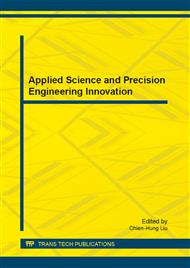p.911
p.916
p.923
p.928
p.934
p.938
p.943
p.948
p.953
A Novel Fuel Cell System Design by Using Ziegler-Nichols-Based Intelligent Fuzzy Controller
Abstract:
This paper proposes a novel fuel cell system design by integrating both methods of Ziegler-Nichols-based PID control and the intelligent fuzzy control, thus the relative stability and disturbance rejection properties can be reserved. This new method is not proposed before for fuel cell control system design. By using PID method for the normal case of fuel cell current requirement, the overshoot of the temperature is 45%, the temperature rise and the settling times are 0.65 sec and 2 sec, respectively. However, by using intelligent fuzzy Ziegler-Nichols-based PID controller design, the overshoot of the temperature is 12%, the temperature rise and the settling times are 0.7 sec and 1 sec, respectively. Thus the proposed method is better. Moreover, this paper also takes the system disturbance variation effect into consideration, e.g. the current requirement is increased by 100% for climbing a slope or speed-up conditions; note a large 60% temperature overshoot is produced by using Ziegler-Nichols based PID controller. But the overshoot is only 20% by using the intelligent fuzzy Ziegler-Nichols-based PID controller. Thus the proposed system is more robust.
Info:
Periodical:
Pages:
934-937
Citation:
Online since:
December 2013
Authors:
Price:
Сopyright:
© 2014 Trans Tech Publications Ltd. All Rights Reserved
Share:
Citation:


